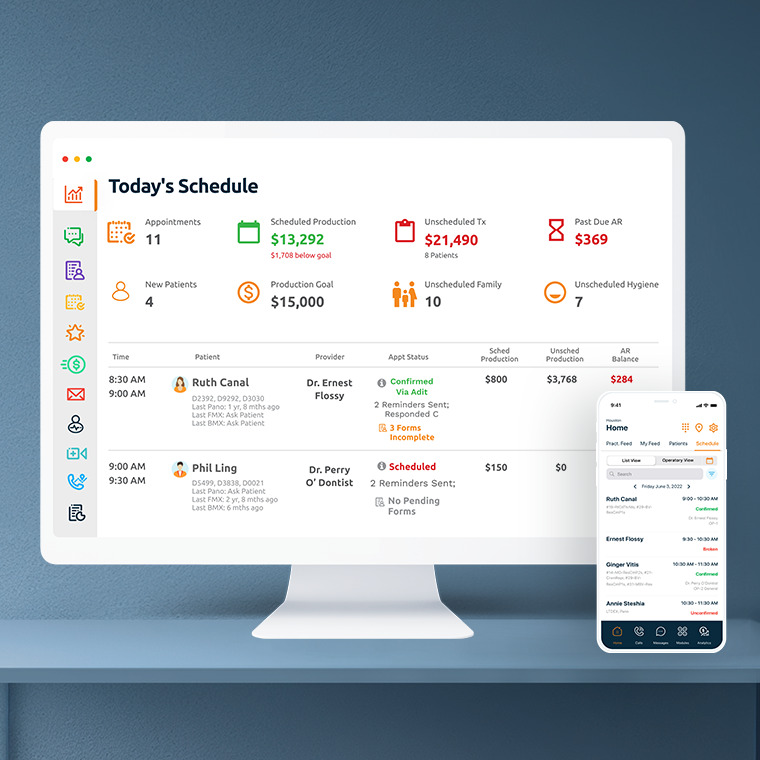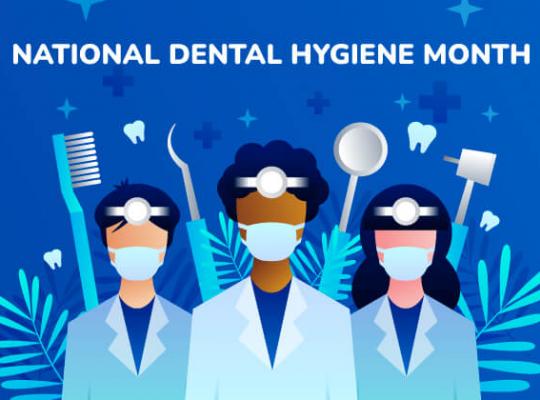The Role of Emotional Intelligence in Dental Patient Care

In dentistry, clinical skills and technical knowledge are undeniably important, but emotional intelligence often doesn’t get the attention it deserves. Being able to understand and manage your own emotions, as well as those of your patients, can make a big difference in how care is delivered and received. For instance, it can help you address the challenges of dealing with anxious or nervous patients more effectively.
This guide will explain why emotional intelligence matters in dental care and offer practical tips on how to develop and use these valuable skills to enhance both patient interactions and your practice dynamics.
Understanding Emotional Intelligence

Emotional intelligence goes far beyond simply managing dental anxiety. At its core, emotional intelligence involves a range of skills that shape how we interact with others and respond to various situations. It includes recognizing and understanding our own emotions and those of others, managing these emotions in ourselves and our relationships, and using this awareness to guide our actions constructively.
In the context of dental care, emotional intelligence helps create a compassionate environment where patients feel genuinely understood and valued. This ability to connect on an emotional level can significantly enhance patient satisfaction and foster trust, leading to more positive experiences and better treatment outcomes.
Self-awareness
This skill involves recognizing and understanding one’s own emotions and their impact on thoughts and behaviors. A dentist who is experiencing higher stress levels before their day has begun can use this self-awareness to manage their anxiety, ensuring that it does not affect their interaction with the patient. This allows them to maintain a calm and professional demeanor, crucial for creating a positive patient experience.
Self-regulation
Another key interpersonal communication skill is managing and adapting your emotions in different situations. For example, picture working with a nervous or difficult patient. Being able to stay calm and not let personal stress affect your professional behavior is crucial. This skill helps maintain a positive and supportive environment in the dental practice, ensuring a better experience for everyone involved.
Motivation

Motivation is about having the drive to reach your goals with both enthusiasm and persistence. Take, for instance, a dentist who actively pursues continuing education opportunities despite a busy schedule. This kind of commitment highlights a dedication to upholding high standards of care. Not only does it help the dentist sharpen their skills, but it also ensures that patients receive top-notch treatment. This dedication can greatly enhance patient trust and satisfaction, making it an essential part of professional growth and excellence.
Empathy
Empathy is all about understanding and sharing the feelings of others. For instance, if a patient is anxious about an upcoming extraction, an empathetic dentist would recognize that fear and offer comforting explanations. This not only helps to ease the patient's worries but also fosters a sense of trust and reassurance. By addressing their concerns with empathy, dental teams can make patients feel genuinely cared for and valued. It's this connection that often leads to a more positive experience and stronger patient relationships.
Social skills
To really shine in social skills, it's all about managing relationships with ease—this means good communication, handling conflicts well, and being able to inspire and influence those around you. In a dental practice, having these strong social skills helps ensure smooth interactions with both patients and colleagues, creating a positive and collaborative atmosphere.
When everyone feels heard and valued, it leads to better teamwork and a more welcoming environment for patients. Mastering these skills can make a big difference in how smoothly your practice runs and how satisfied your patients feel.
Key Takeaways
- Self-awareness helps dental professionals manage their emotional responses and maintain a professional demeanor.
- Self-regulation enables effective handling of challenging situations without personal stress impacting patient care.
- Motivation drives continuous improvement and dedication to high standards in patient care.
- Empathy fosters trust and comfort, making patients feel valued and understood.
- Strong social skills contribute to effective communication and a positive practice environment.
Enhancing Patient Communication

Effective communication is the cornerstone of successful dental care, and emotional intelligence plays a pivotal role in facilitating clear, compassionate, and effective interactions between dental professionals and their patients.
How Feeley Dental & Associates gained a full day back each week with Adit What happens when a dental office replaces outdated tools with one seamless platform? Feeley Dental & Associates turned to Adit to streamline forms, communication,...
Download Case StudyActive Listening
Active listening is essential for effective communication. It involves more than simply hearing what patients say; it’s about truly understanding their concerns and feelings. For example, observing both what patients say and their body language or facial expressions can ensure your team responds more effectively and builds stronger trust. This attentiveness leads to more accurate responses and enhances patient relationships.
Empathetic Responses
Offering empathetic responses is crucial for alleviating patient anxiety and building trust. When patients express their fears or concerns, it’s important to respond with genuine empathy and reassurance. If a patient is anxious about undergoing a root canal, take the time to explain the procedure in detail and discuss how pain will be managed. This approach not only helps ease fears but also establishes a foundation of trust and creates a more comforting atmosphere for future visits.
Tailoring Communication Styles
Personalized communication involves adjusting how you interact based on each patient’s preferences and needs. Some patients might prefer detailed explanations, while others might want just the essentials. Dental software can assist in this by allowing you to customize communication with each patient and send personalized reminders or educational materials. This ensures that each patient receives information in the way that suits them best and boosts retention rates.
Key Takeaways
- Active listening improves understanding of patient concerns and enhances trust.
- Empathetic responses help alleviate patient anxiety and build rapport.
- Tailoring communication styles to individual patient needs ensures comfort and improves treatment compliance.
Building Trust and Rapport

Trust is fundamental in the dentist-patient relationship, and emotional intelligence plays a critical role in cultivating and maintaining it. Effective trust-building strategies include demonstrating authentic care, creating a comforting environment, and resolving conflicts empathetically.
Building Patient Connections
Beyond the clinical aspects of care, small gestures like remembering a patient’s name or asking about their family can make them feel genuinely valued and respected. These personal touches go a long way in establishing a deeper connection, which can significantly boost patient engagement.
When patients feel that their dentist truly cares about them beyond just their dental health, it fosters loyalty and builds trust. This higher level of patient engagement creates a more positive experience overall and encourages patients to return and maintain their relationship with the practice.
Creating a Comforting Environment
Establishing a comforting environment is essential for reducing patient anxiety. A calm and empathetic demeanor, combined with thoughtful actions such as offering comfort items or clearly explaining procedures, can significantly enhance the patient experience. Dental software supports this effort by providing tools for gathering patient feedback and conducting satisfaction surveys, allowing practices to continually refine and improve the patient experience based on real-time insights.
Effective Conflict Resolution
Addressing patient concerns with empathy and clear communication is key to effective conflict resolution. If a patient is dissatisfied with their treatment results, handling their concerns patiently, providing clear explanations, and offering viable solutions can transform a negative review into a positive one, thereby preserving and even strengthening trust.
Key Takeaways
- Demonstrating authentic care fosters a deeper connection and patient loyalty.
- Creating a comforting environment helps alleviate patient anxiety and enhances the experience.
- Effective conflict resolution maintains trust and turns negative experiences into positive outcomes.
Managing Patient Anxiety

Dental anxiety is a common issue that can impact treatment outcomes and patient compliance. Emotional intelligence enables dental professionals to manage and mitigate patient anxiety effectively.
Identifying Anxiety Triggers
Understanding what causes patient anxiety starts with recognizing the physical signs of stress and listening closely to their concerns. By using features like digital patient forms and questionnaires in dental software, practices can gather valuable information about patients' fears and anxieties before their appointments.
For instance, if patients fill out a pre-visit questionnaire that asks about their past experiences or concerns, your team can identify those who may be particularly nervous about certain procedures. This allows practitioners to address these concerns in advance, helping to make the experience more comfortable for the patient.
Offering Emotional Support
Providing emotional support is crucial for helping patients feel more at ease. This support can come in the form of verbal reassurances or non-verbal cues, such as a calming tone or a comforting touch. If a patient seems nervous, take the time to discuss their worries in detail or offer extra information to alleviate their fears. This proactive approach helps to tackle anxiety before it becomes a major issue.
Implementing Comfort Measures
Creating a comforting environment is key to reducing patient stress. While emotional support plays a significant role, dental software can enhance these efforts by offering tools that improve the overall appointment experience. Features like virtual office tours and online treatment education videos on your dental website can help demystify procedures, further easing the anxiety of patients.
Key Takeaways
- Identifying anxiety triggers allows for proactive management and support.
- Offering emotional support through reassurance and comfort measures enhances patient comfort and reduces stress.
Improving Treatment Compliance

Making sure patients stick to their treatment plans is essential for effective dental care. A big part of this is using emotional intelligence to build strong relationships through open communication, motivation, and support. Dental software can really boost these efforts by simplifying processes and keeping follow-ups consistent.
Encouraging Open Communication
It's crucial to encourage open communication to tackle any concerns or obstacles to sticking with the treatment plan. When patients feel comfortable sharing their issues, you can address them proactively. Dental software helps by providing secure and efficient ways for patients to ask questions or report any difficulties they’re having with their treatment plan.
Motivating Treatment Compliance
Keeping patients motivated is about highlighting the importance of their treatment and celebrating their progress. Positive reinforcement and clear explanations about how sticking to the plan benefits them are key. Dental software can help by sending out automated reminders, progress updates, and motivational messages to keep patients engaged and committed.
Providing Ongoing Support
Continuous support is vital to ensure patients feel supported throughout their treatment journey. Emotional intelligence means recognizing and empathizing with any struggles patients face. Dental software can support this by tracking progress and offering features like remote consultations or additional resources. These tools help maintain motivation and adherence by giving regular feedback and encouragement.
Key Takeaways
- Open communication, supported by secure dental software channels, helps address treatment barriers effectively.
- Automated reminders and motivational messages from dental software can boost patient adherence and engagement.
- Ongoing support through virtual check-ins and progress tracking ensures continuous patient motivation and compliance.
Enhancing Team Dynamics

A thriving dental practice depends on a strong, well-coordinated team, and emotional intelligence plays a crucial role in building a positive and productive work environment. When dental professionals focus on collaboration, empathy, and support, they create a harmonious atmosphere that benefits both the team and the patients. Incorporating state-of-the-art dental software like Adit can boost these efforts by enhancing communication and simplifying processes.
Facilitating Effective Collaboration
Effective collaboration begins with managing relationships with empathy and respect. Emotional intelligence plays a crucial role in creating a supportive work environment where every team member feels valued. Dental software can support this by offering tools for seamless communication and project management. For example, internal chat systems and shared calendars within practice management software help team members stay coordinated and aligned, ensuring that everyone is informed and working together efficiently.
Leading with Empathy
Empathetic leadership is vital for motivating and inspiring team members. Leaders who show understanding and support contribute to a positive work atmosphere, which boosts team morale and productivity. Recognizing team members' efforts, providing constructive feedback, and offering support during tough times are all ways to maintain a motivated and cohesive team.
Supporting Colleagues
Appreciating your dental team's hard work requires acknowledging their contributions and providing emotional support. This can involve offering encouragement, assisting with workload management, and addressing any personal or professional challenges they may face. Creating a supportive environment can help reduce burnout and enhance job satisfaction, ultimately leading to a more engaged and satisfied team.
Key Takeaways
- Facilitating effective collaboration creates a supportive and harmonious work environment.
- Leading with empathy enhances team morale and productivity.
- Supporting colleagues helps reduce burnout and improve job satisfaction.
Unleash Your Practice’s Full Potential with Adit Dental Software!

Emotional intelligence is key to providing top-notch dental patient care. It influences everything from communication and building trust to managing patient anxiety and working well with your team. With Adit’s innovative tools, you can make your practice run more smoothly and improve how you interact with patients.
Our dental software is tailored to fit your specific needs, letting your team focus on what they do best—delivering excellent dental care. This not only boosts patient satisfaction but also creates a more efficient and harmonious practice environment.
Here’s how Adit makes this vision a reality for dentists everywhere:
- Telemed: Connect with patients virtually, anytime, anywhere.
- Patient Recall: Keep your patients on track with automated appointment reminders.
- CareCredit Integration: Help patients get the flexible financing options they need through CareCredit.
- Treatment Planning: Optimize patient care with our comprehensive treatment planning software.
- Online Scheduling: Offer a hassle-free booking experience with real-time online scheduling.
- Pozative Reviews: Build your reputation with our intuitive reputational management tools for patient feedback.
- Adit Pay: Simplify payments and billing processes with this end-to-end collections integration.
- Practice Analytics: Gain actionable insights to fuel your practice’s success using AI-driven data analytics.
- Adit Voice: Enhance team communication and coordination.
- Patient Forms: Transition to a paperless practice with digital intake forms.
- Reminders & Patient Text: Keep your patients informed and engaged.
- Internal Chat: Keep your dental employees connected–any time, anywhere.
- Call Tracking: Analyze and improve your practice’s marketing strategies with this integrated call tracking feature.
- Dental Digital Marketing: Drive growth with tailored marketing strategies.
- Website Design & PPC Ads: Boost your online presence and attract new patients across your most popular online marketing channels.
- Social Media Advertising: Engage with your community through targeted ads.
Book a demo with Adit today and see how our practice management tools can take your patient care and operations management to the next level.
more about Adit?
Say goodbye to the hassle of using multiple tools. Adit centralizes your calls, texts, payments, reviews, and scheduling into one powerful dashboard. Simplify your operations and boost patient satisfaction today.
Schedule a DemoAngela is a former English teacher turned marketing content specialist. Over the past 10 years, she’s developed marketing strategies to forge enduring bonds between B2B, B2C and SaaS companies and their clients through holistic education, effective communication, and captivating storytelling that moves audiences to act.
Get a $25 Gift Card when you take a demo
Schedule a DemoGet a $50 Gift Card
when you take a demo
Looks like you're out of bounds!
Hey there! Your current location falls outside Adit's area of operation. If this is unexpected, try disabling your VPN and refresh your page. For further assistance or to book a live demo, connect with us at 832-225-8865.
March 4 Amazon Demo Promo
Terms and Conditions
Last Updated: March 4, 2026Offer ends March 7, 2026, and is limited to prospective customers who sign an annual agreement before March 31, 2026. Gift card will be emailed to the company owner or established representative within 4 weeks of signing the annual agreement. Offer may not be combined with any other offers and is limited to one (1) gift card per office. Offer is not available to current customers or to prospective customers or individuals that have participated in a Adit demo during the prior six (6) months. Recipient is responsible for all taxes and fees associated with receipt and/or use of the gift card as well as reporting the receipt of the gift card as required under applicable federal and state laws. Adit is not responsible for and will not replace the gift card if it is lost or damaged, is not used within any applicable timeframe, or is misused by the recipient. Adit is not responsible for any injury or damage to persons or property which may be caused, directly or indirectly, in whole or in part, from the recipient’s participation in the promotion or receipt or use of the gift card. Recipient agrees to indemnify, defend and hold harmless Adit from and against any and all claims, expenses, and liabilities (including reasonable attorney’s fees) arising out of or relating to a recipient’s participation in the promotion and/or recipient’s acceptance, use or misuse of the gift card. This offer is sponsored by Adit Communications, Inc. and is in no way sponsored, endorsed or administered by, or associated with Amazon.
Thank You!
We appreciate your interest! Adit AI will be calling you in the next few minutes!
Why Adit?
Cut your software bill by up to 60% when you merge everything your dental office needs to run under one roof.
Centralize Communications
- Phones & TeleMed
- Emails & eFax
- Texting & Reminders
- Call Tracking and more!
Streamline Operations
- Patient Forms
- Online Scheduling
- Payments
- Reviews and more!
Boost Production
- Performance Dashboards
- Morning Huddle
- Claims & Collections
- Patient Profiles
- Follow Up Lists
- Year Over Year Metrics
Acquire More Patients
- Digital Marketing
- Website Design
- SEO
- Google Ads
- Facebook Ads
when you sign up with Adit!
Sign up by filling out the form







